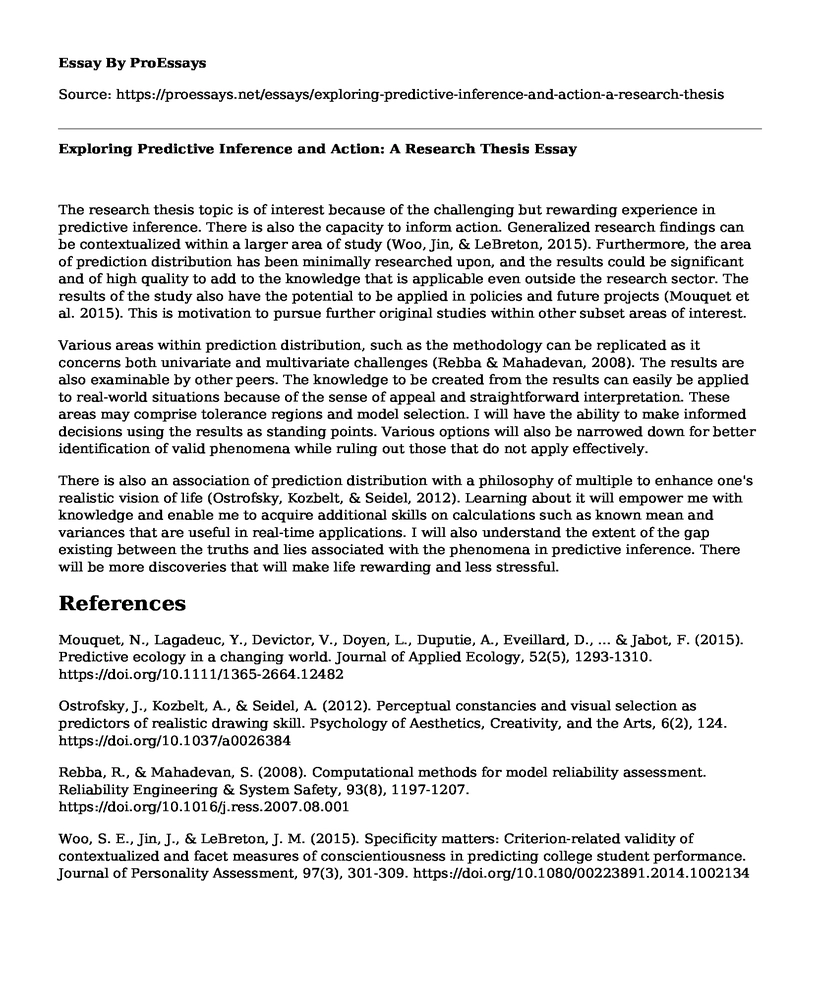The research thesis topic is of interest because of the challenging but rewarding experience in predictive inference. There is also the capacity to inform action. Generalized research findings can be contextualized within a larger area of study (Woo, Jin, & LeBreton, 2015). Furthermore, the area of prediction distribution has been minimally researched upon, and the results could be significant and of high quality to add to the knowledge that is applicable even outside the research sector. The results of the study also have the potential to be applied in policies and future projects (Mouquet et al. 2015). This is motivation to pursue further original studies within other subset areas of interest.
Various areas within prediction distribution, such as the methodology can be replicated as it concerns both univariate and multivariate challenges (Rebba & Mahadevan, 2008). The results are also examinable by other peers. The knowledge to be created from the results can easily be applied to real-world situations because of the sense of appeal and straightforward interpretation. These areas may comprise tolerance regions and model selection. I will have the ability to make informed decisions using the results as standing points. Various options will also be narrowed down for better identification of valid phenomena while ruling out those that do not apply effectively.
There is also an association of prediction distribution with a philosophy of multiple to enhance one's realistic vision of life (Ostrofsky, Kozbelt, & Seidel, 2012). Learning about it will empower me with knowledge and enable me to acquire additional skills on calculations such as known mean and variances that are useful in real-time applications. I will also understand the extent of the gap existing between the truths and lies associated with the phenomena in predictive inference. There will be more discoveries that will make life rewarding and less stressful.
References
Mouquet, N., Lagadeuc, Y., Devictor, V., Doyen, L., Duputie, A., Eveillard, D., ... & Jabot, F. (2015). Predictive ecology in a changing world. Journal of Applied Ecology, 52(5), 1293-1310. https://doi.org/10.1111/1365-2664.12482
Ostrofsky, J., Kozbelt, A., & Seidel, A. (2012). Perceptual constancies and visual selection as predictors of realistic drawing skill. Psychology of Aesthetics, Creativity, and the Arts, 6(2), 124. https://doi.org/10.1037/a0026384
Rebba, R., & Mahadevan, S. (2008). Computational methods for model reliability assessment. Reliability Engineering & System Safety, 93(8), 1197-1207. https://doi.org/10.1016/j.ress.2007.08.001
Woo, S. E., Jin, J., & LeBreton, J. M. (2015). Specificity matters: Criterion-related validity of contextualized and facet measures of conscientiousness in predicting college student performance. Journal of Personality Assessment, 97(3), 301-309. https://doi.org/10.1080/00223891.2014.1002134
Cite this page
Exploring Predictive Inference and Action: A Research Thesis. (2023, Feb 15). Retrieved from https://proessays.net/essays/exploring-predictive-inference-and-action-a-research-thesis
If you are the original author of this essay and no longer wish to have it published on the ProEssays website, please click below to request its removal:
- Cultural Relevance of Mental Health Patient Navigators for Ethnic Minority Groups
- Informed Consent for Mentally Incapacitated Patients Essay
- Improvements to the Correctional System Paper Example
- Annotated Bibliography on Coaches' Influence on Student-Athlete Motivation, Stress, & Skill
- Personality Disorders: Anger, Unhappiness, Isolation - Essay Sample
- Essay Sample on Memory Errors: Impact on Daily Life
- Essay Example on Bipolar II Disorder: A Historical Look at its Development







